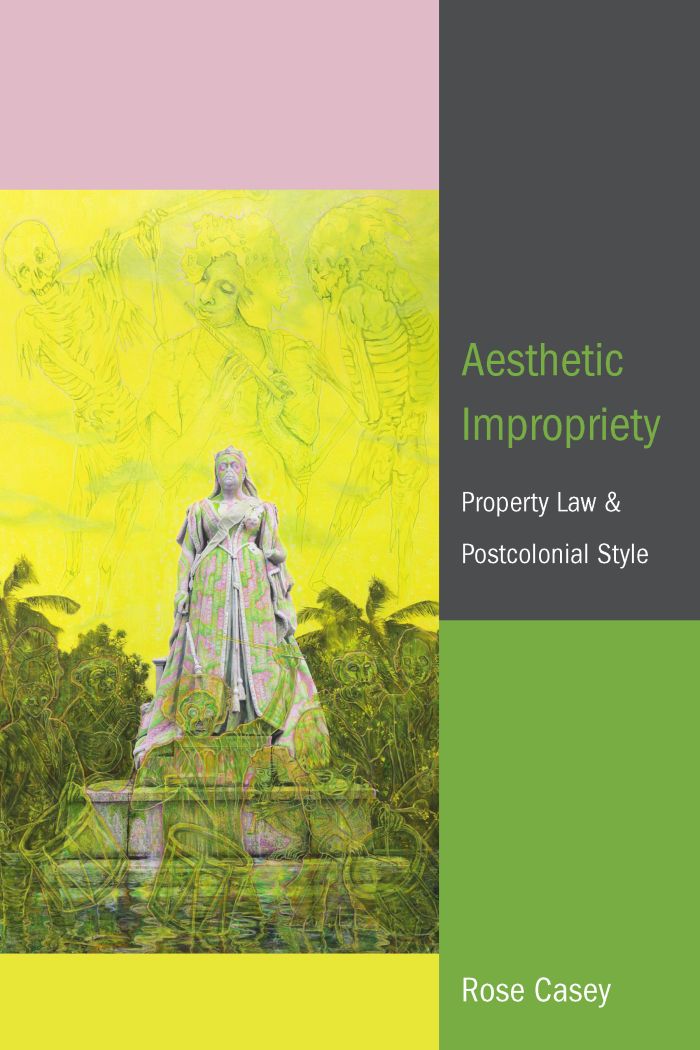Aesthetic Impropriety
Property Law and Postcolonial Style

This book can be opened with

Across Africa, Asia, and the Americas, colonial Britain’s property laws are in the process of being transformed. Aesthetic Impropriety analyzes vanguard legal actions and literary innovations to reveal contemporary reforms to property law that are undoing law’s colonial legacies. Casey traces precise legal histories across distinct jurisdictions throughout the anglophone world, revealing the connection between land law and petroleum extraction in the Niger Delta, inheritance and divorce laws and gender inequality in India, intellectual property law and Indigenous dispossession in South Africa, and admiralty law and racialized non-personhood in the English Atlantic. In response to these manifold forms of dispossession, significant reforms are underway, including through common law suits, statutory reform, and proposed changes to legal doctrine.
Casey develops the concept of aesthetic impropriety to identify shared structures of thought across legal and literary venues. She shows that writers of poetry and prose are also transforming harmful property laws: in Nigeria, Ben Okri and Chigozie Obioma have articulated symbiotic ecological relationships that are also evidenced in recent actions against petroleum companies; in India, Arundhati Roy’s challenge to divorce laws has preempted similar attempts at reform in Parliament; in South Africa, Zoë Wicomb theorized protections for Indigenous modes of creative production nineteen years before they were signed into law; and in the Americas, M. NourbeSe Philip has proposed a novel method of achieving justice for the one hundred fifty enslaved people who were killed in the 1781 Zong massacre.
Aesthetic Impropriety makes a convincing case for literature’s generative capacities and registers the enduring significance of the postcolonial as a necessary framework for understanding globalized inequality in the twenty-first century. By analyzing shared legal and aesthetic transformations, Aesthetic Impropriety argues that law and literature play vital roles in creating anticolonial world orders.
As Casey points out, law is often viewed—for good reason—as repressive and dispossessive, murderous and genocidal, having authorized theft, piracy, enslavement, and resource extraction that continues to immiserate vulnerable groups around the world. By looking to an impressive array of examples from the arts and literature, Casey shows with elegant argumentation and lucidity how aesthetic objects can circulate discursively to gradually change structures of feeling and habits of mind, and lay the groundwork for actual changes to laws that open on to more egalitarian forms of living in the world.—Nicole Rizzuto, Georgetown University
Aesthetic Impropriety reconceives the aesthetic force of literature to theorize justice. Casey’s gorgeous close readings and keen attention to the histories of English-derived property law generate new ways to reckon with collective dispossession.—Angela Naimou, Clemson University
Introduction: An Aesthetic Theory of Law and Literature | 1
1. Symbiosis: Oil Extraction in the Racial Capitalocene | 29
2. Reciprocity: Female Dispossession in Inheritance and Divorce | 62
3. Accretion: Decolonizing Intellectual Property Law | 90
4. Dispersal: Admiralty Law and Raising the Dead | 120
Conclusion: Hope’s Impropriety | 154
Acknowledgments | 161
Notes | 165
Works Cited | 201
Index | 219




